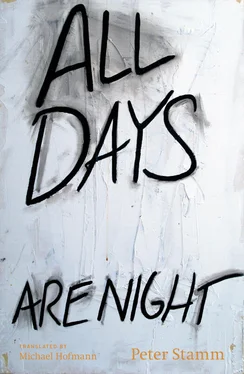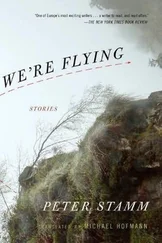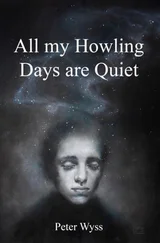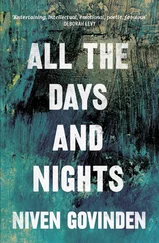Peter Stamm - All Days Are Night
Здесь есть возможность читать онлайн «Peter Stamm - All Days Are Night» весь текст электронной книги совершенно бесплатно (целиком полную версию без сокращений). В некоторых случаях можно слушать аудио, скачать через торрент в формате fb2 и присутствует краткое содержание. Год выпуска: 2014, Издательство: Other Press, Жанр: Современная проза, на английском языке. Описание произведения, (предисловие) а так же отзывы посетителей доступны на портале библиотеки ЛибКат.
- Название:All Days Are Night
- Автор:
- Издательство:Other Press
- Жанр:
- Год:2014
- ISBN:нет данных
- Рейтинг книги:3 / 5. Голосов: 1
-
Избранное:Добавить в избранное
- Отзывы:
-
Ваша оценка:
- 60
- 1
- 2
- 3
- 4
- 5
All Days Are Night: краткое содержание, описание и аннотация
Предлагаем к чтению аннотацию, описание, краткое содержание или предисловие (зависит от того, что написал сам автор книги «All Days Are Night»). Если вы не нашли необходимую информацию о книге — напишите в комментариях, мы постараемся отыскать её.
All Days Are Night — читать онлайн бесплатно полную книгу (весь текст) целиком
Ниже представлен текст книги, разбитый по страницам. Система сохранения места последней прочитанной страницы, позволяет с удобством читать онлайн бесплатно книгу «All Days Are Night», без необходимости каждый раз заново искать на чём Вы остановились. Поставьте закладку, и сможете в любой момент перейти на страницу, на которой закончили чтение.
Интервал:
Закладка:
Over time, Gillian had almost forgotten about the film, the only time she was reminded of it was when she was looking for something in the drawer. She hadn’t asked Matthias what he was doing there. Maybe he was snooping, but he could have been hunting for a perfectly innocent paper clip or postage stamp. She wondered if the lab assistant who developed the film might indeed have run off some prints for himself. But in fact she didn’t care either way. The woman in the photographs no longer existed.
The next morning, soon after breakfast, a policewoman came to the hospital. She was pretty and rather delicate looking. She shook Gillian’s hand and introduced herself, Manuela Bauer from the cantonal police. She unpacked a laptop and a small printer. Gillian said she had no memory of anything, but the policewoman was busy with the machinery and didn’t react. At last she was ready, sat in the chair by the bed, and began to type. She read Gillian her rights and said she didn’t have to make a statement that would incriminate her or her husband.
It was an accident, said Gillian.
The policewoman said it was a case of grave physical injury.
Are you going to lock him up? asked Gillian.
The policewoman said of course there wouldn’t be any proceedings against the deceased, but the case needed to be looked into just the same. She asked Gillian about the night of the accident, she wanted to know where they had been, and who else had been there. Gillian wondered if she would be made responsible for the whole thing if she confessed. She was the only person who knew the truth, and she wasn’t obliged to make a statement. In spite of that she related everything as she remembered it.
And what was this fight about? asked the policewoman.
That’s neither here nor there, said Gillian, it was silly. Anyway, I had quite a lot to drink in a short time afterward.
Did you ask your husband to drive?
It was obvious that I wasn’t capable anymore.
You could have called a taxi.
Yes, said Gillian, we could have spent the night there too. But we didn’t.
She had thought she didn’t remember anything of the night, but as she spoke, quite a lot swam into her consciousness: she had to hold on to the car as she climbed in, Dagmar had tried to persuade her to stay. Matthias had said he would take back roads, that way they wouldn’t get caught up in any police checks. Gillian felt sick, she rolled down the window, and the cold night air cut into her face. Matthias drove in silence. At that moment, she couldn’t imagine they would ever be reconciled. Only the thought that that meant a separation oppressed her.
She must have dropped off. When she awoke, they were driving along a narrow forest road. The asphalt glistened with moisture, scraps of mist appeared among the trees. There were no other cars around. The radio was playing loud rock music. Gillian switched to a jazz channel and closed her eyes. Without a word, Matthias switched back to the heavy metal station. Was that the moment he lost control of the car? Her next memory was the weightlessness. And then the ghostly silence.
He struck a deer, said the policewoman.
It wasn’t his fault, said Gillian, and she started to cry.
He shouldn’t have been driving, said the policewoman, never mind what you said or did.
It was my fault, said Gillian, still crying.
I’m sorry, said the policewoman, sounding impatient, I can’t help you. Legally, you’re not to blame.
Before she left, she gave Gillian a leaflet from a victims’ support group and asked if she wanted any support or psychological assistance.
Gillian shook her head. My parents are there for me. I need a new nose.
She tried to laugh, the whiffling sound she made disgusted her.
The taxi driver helped Gillian into the wheelchair and rolled her to the foot of the stairs, and then he went back to fetch her suitcase from the trunk.
It’s okay, she said, someone will come down.
She had to lay the suitcase across her lap because she couldn’t steer the wheelchair with just one hand. She took the elevator to the top floor. Luckily the thresholds were flush throughout the building. The silent apartment was a shock.
Hello, called Gillian, even though she knew there was no one there. Hello?
They had bought the place three years ago. The rooms were large, there were light parquet floors and full-length windows. In the living room there was a glass door that gave on to a balcony. From there you could see right across the city and the lake. A person standing outside could see into the living room, but that had never bothered Gillian. On the contrary, she loved the transparency and laughed when friends said she was living in a shop window or an aquarium.
Most of the other apartments were occupied by older people, who hung curtains in the windows and rolled down blinds every evening. Gillian hardly knew her neighbors. They exchanged greetings when they ran into each other on the stairs or in the underground garage.
The living room had been tidied, there was a bunch of withered roses on the dining table. Gillian had bought them two weeks before, to give to Dagmar, but she had forgotten to take them. Presumably her mother had left them there out of respect. The water in the vase was cloudy and stank, some of the petals had fallen. Gillian collected them in her hand, they felt satin soft. She crushed them in her fist, then she dropped them.
She rolled into the kitchen, which was spotless. That was her mother’s way of showing love or care. When Gillian watched her at work sometimes, she was reminded of the stewardess her mother had once been. Every movement was practiced, even her smile looked experienced. Sometime Gillian had stopped confiding in her and started treating her with the same friendly inattentiveness as her father did.
The fridge was largely empty, a couple of jars of different mustards, some dried tomatoes in olive oil, dill pickles, a few cans of beer, and the bottle of Prosecco they kept for unexpected visitors.
Gillian tried to shift off the wheelchair onto the toilet. Instead of getting the crutches in the living room, she pulled herself up on the sink. Her legs gave way, and she crumpled on the floor and banged into the footrests of the chair, which rolled away and struck the wall with a loud crash. Sitting up, she pulled and shuffled her way to the toilet. If it had been up to the doctor, she wouldn’t even have been given the wheelchair, but she had asked, just for the first couple of days. Still lying on the floor, she pulled her trousers down. The chill of the tiles heightened her need to pee, and she tried to pull herself up. Then it was too late, she felt the warmth of the quickly spreading puddle. She tried to get her pants off, but it was too late. Gillian felt nauseous. She stripped off, and mopped the floor with her sodden pants. All she could manage were a couple of dry sobs that didn’t sound much like crying.
Her life before the accident had been one long performance. Her job, the studio, the designer clothes, the trips to cities, the meals in good restaurants, the visits to her parents and to Matthias’s mother. It must have been a lie if it was so easy to destroy with a moment’s inattention, a false move. The accident was bound to happen sooner or later, whether in the form of a sudden catastrophe or a gradual unraveling, it was coming.
She knew she could use her legs, the doctor had even encouraged her to. She heaved herself back into the wheelchair and rolled into the living room. On the sofa lay a book she had started a couple of weeks ago, a Swedish thriller. She found her place but was unable to concentrate and soon put it aside. She flicked through a fashion magazine. In the building opposite a window was opened, her neighbor shook out a duvet. Gillian knew her, vaguely. She shrank back, half naked as she was, but the woman didn’t seem to have seen her, remained standing in the window for a minute or two, and looked down at the street. Perhaps she was looking out for the mailman or her children who might be back from school soon.
Читать дальшеИнтервал:
Закладка:
Похожие книги на «All Days Are Night»
Представляем Вашему вниманию похожие книги на «All Days Are Night» списком для выбора. Мы отобрали схожую по названию и смыслу литературу в надежде предоставить читателям больше вариантов отыскать новые, интересные, ещё непрочитанные произведения.
Обсуждение, отзывы о книге «All Days Are Night» и просто собственные мнения читателей. Оставьте ваши комментарии, напишите, что Вы думаете о произведении, его смысле или главных героях. Укажите что конкретно понравилось, а что нет, и почему Вы так считаете.












